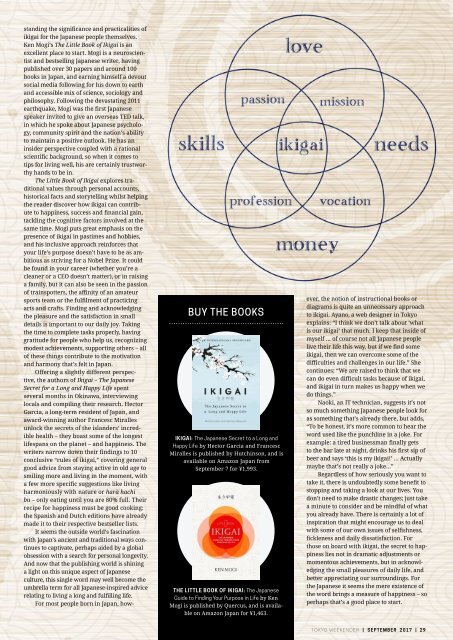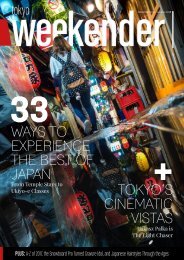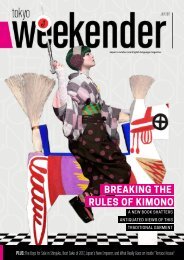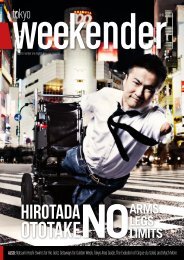Tokyo Weekender - September 2017
Autumn eyes: Harajuku lashes and more tips from a/w17. GACKT: "There's an emptiness in people's hearts". Find your "ikigai": What makes you get up in the morning? Plus: "Life in transit" photo story, osaka on two wheels, the tokyo café serving prophecies, and ufc's big comeback.
Autumn eyes: Harajuku lashes and more tips from a/w17.
GACKT: "There's an emptiness in people's hearts".
Find your "ikigai": What makes you get up in the morning?
Plus: "Life in transit" photo story, osaka on two wheels, the tokyo café serving prophecies, and ufc's big comeback.
Create successful ePaper yourself
Turn your PDF publications into a flip-book with our unique Google optimized e-Paper software.
BUY THE BOOKS<br />
IKIGAI: The Japanese Secret to a Long and<br />
Happy Life by Hector Garcia and Francesc<br />
Miralles is published by Hutchinson, and is<br />
available on Amazon Japan from<br />
<strong>September</strong> 7 for ¥1,993.<br />
THE LITTLE BOOK OF IKIGAI: The Japanese<br />
Guide to Finding Your Purpose in Life by Ken<br />
Mogi is published by Quercus, and is available<br />
on Amazon Japan for ¥1,463.<br />
standing the significance and practicalities of<br />
ikigai for the Japanese people themselves.<br />
Ken Mogi’s The Little Book of Ikigai is an<br />
excellent place to start. Mogi is a neuroscientist<br />
and bestselling Japanese writer, having<br />
published over 30 papers and around 100<br />
books in Japan, and earning himself a devout<br />
social media following for his down to earth<br />
and accessible mix of science, sociology and<br />
philosophy. Following the devastating 2011<br />
earthquake, Mogi was the first Japanese<br />
speaker invited to give an overseas TED talk,<br />
in which he spoke about Japanese psychology,<br />
community spirit and the nation’s ability<br />
to maintain a positive outlook. He has an<br />
insider perspective coupled with a rational<br />
scientific background, so when it comes to<br />
tips for living well, his are certainly trustworthy<br />
hands to be in.<br />
The Little Book of Ikigai explores traditional<br />
values through personal accounts,<br />
historical facts and storytelling whilst helping<br />
the reader discover how ikigai can contribute<br />
to happiness, success and financial gain,<br />
tackling the cognitive factors involved at the<br />
same time. Mogi puts great emphasis on the<br />
presence of ikigai in pastimes and hobbies,<br />
and his inclusive approach reinforces that<br />
your life’s purpose doesn’t have to be as ambitious<br />
as striving for a Nobel Prize. It could<br />
be found in your career (whether you’re a<br />
cleaner or a CEO doesn’t matter), or in raising<br />
a family, but it can also be seen in the passion<br />
of trainspotters, the affinity of an amateur<br />
sports team or the fulfilment of practicing<br />
arts and crafts. Finding and acknowledging<br />
the pleasure and the satisfaction in small<br />
details is important to our daily joy. Taking<br />
the time to complete tasks properly, having<br />
gratitude for people who help us, recognizing<br />
modest achievements, supporting others – all<br />
of these things contribute to the motivation<br />
and harmony that’s felt in Japan.<br />
Offering a slightly different perspective,<br />
the authors of Ikigai – The Japanese<br />
Secret for a Long and Happy Life spent<br />
several months in Okinawa, interviewing<br />
locals and compiling their research. Hector<br />
Garcia, a long-term resident of Japan, and<br />
award-winning author Francesc Miralles<br />
unlock the secrets of the islanders’ incredible<br />
health – they boast some of the longest<br />
lifespans on the planet – and happiness. The<br />
writers narrow down their findings to 10<br />
conclusive “rules of ikigai,” covering general<br />
good advice from staying active in old age to<br />
smiling more and living in the moment, with<br />
a few more specific suggestions like living<br />
harmoniously with nature or hara hachi<br />
bu – only eating until you are 80% full. Their<br />
recipe for happiness must be good cooking:<br />
the Spanish and Dutch editions have already<br />
made it to their respective bestseller lists.<br />
It seems the outside world’s fascination<br />
with Japan’s ancient and traditional ways continues<br />
to captivate, perhaps aided by a global<br />
obsession with a search for personal longevity.<br />
And now that the publishing world is shining<br />
a light on this unique aspect of Japanese<br />
culture, this single word may well become the<br />
umbrella term for all Japanese-inspired advice<br />
relating to living a long and fulfilling life.<br />
For most people born in Japan, however,<br />
the notion of instructional books or<br />
diagrams is quite an unnecessary approach<br />
to ikigai. Ayano, a web designer in <strong>Tokyo</strong><br />
explains: “I think we don’t talk about ‘what<br />
is our ikigai’ that much. I keep that inside of<br />
myself ... of course not all Japanese people<br />
live their life this way, but if we find some<br />
ikigai, then we can overcome some of the<br />
difficulties and challenges in our life.” She<br />
continues: “We are raised to think that we<br />
can do even difficult tasks because of ikigai,<br />
and ikigai in turn makes us happy when we<br />
do things.”<br />
Naoki, an IT technician, suggests it’s not<br />
so much something Japanese people look for<br />
as something that’s already there, but adds,<br />
“To be honest, it’s more common to hear the<br />
word used like the punchline in a joke. For<br />
example: a tired businessman finally gets<br />
to the bar late at night, drinks his first sip of<br />
beer and says ‘this is my ikigai!’ ... Actually<br />
maybe that’s not really a joke...”<br />
Regardless of how seriously you want to<br />
take it, there is undoubtedly some benefit to<br />
stopping and taking a look at our lives. You<br />
don’t need to make drastic changes; just take<br />
a minute to consider and be mindful of what<br />
you already have. There is certainly a lot of<br />
inspiration that might encourage us to deal<br />
with some of our own issues of selfishness,<br />
fickleness and daily dissatisfaction. For<br />
those on board with ikigai, the secret to happiness<br />
lies not in dramatic adjustments or<br />
momentous achievements, but in acknowledging<br />
the small pleasures of daily life, and<br />
better appreciating our surroundings. For<br />
the Japanese it seems the mere existence of<br />
the word brings a measure of happiness – so<br />
perhaps that’s a good place to start.<br />
TOKYO WEEKENDER | SEPTEMBER <strong>2017</strong> | 29
















